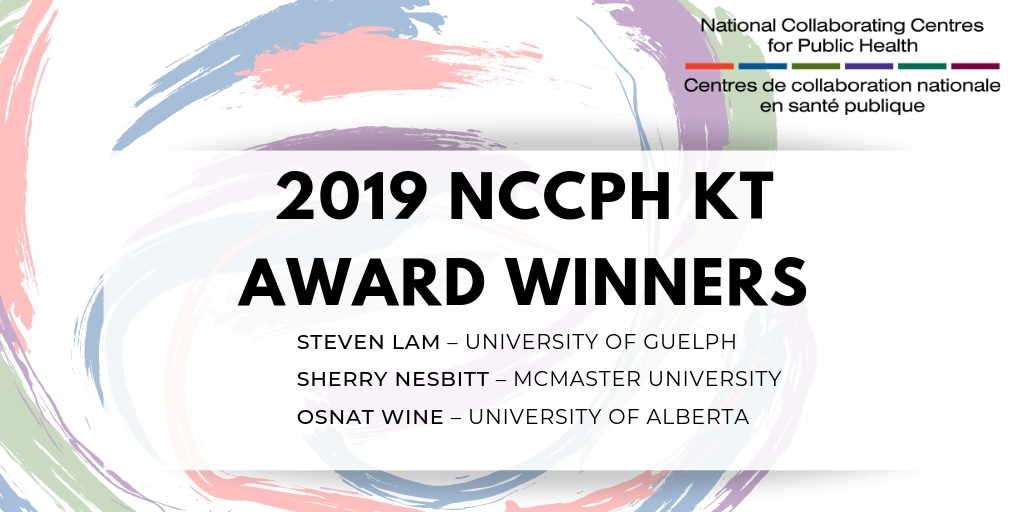Main Menu


Each year the National Collaborating Centre for Public Health awards three trainees for their outstanding KT projects. These awards are based on
relevance to knowledge translation in public health;
creativity/innovation shown in the project;
scholarliness of the project;
potential impact of the project; and
quality and degree of support of academic supervisor.
We conneKTed with Osnat Wine, one of the 2019 award winners and PhD candidate in the Department of Pediatrics at University of Alberta, to talk about her iKT environmental health project.
Wine has always been passionate about environmental health. However, it was during her master’s research that she became interested in the process of building environmental health communications.
Wine took that passion to become one of three recipients of the 2019 National Collaborating Centres for Public Health KT Award for her thesis: Identifying essential components of the collaborative process in integrated knowledge translation: an environmental health research case study.
The results of her award winning research evolved out of the Data Mining and Neonatal Outcomes (DoMiNO)Project, using the new approach of data mining to find associations between industrial pollutants and adverse birth outcomes. Initially, she was at the heart of this collaborative study, initiated by the Departments of Pediatrics and Computer Science at the University of Alberta, as a research coordinator. However, she eventually transitioned to student, where she researched the team itself, exploring the key elements required for the team’s collaboration as a case study.
The DoMiNO Project team was large and diverse consisting of at least 20 individuals, including researchers and knowledge users, from different disciplines.
It is through her observations that Wine now promotes the invaluable contributions knowledge users can make when they are included on a research team. “Not only do they enhance the creation of knowledge but also expand your KT capabilities and reach.” As well, she has become a strong advocate of interdisciplinary collaborative work. Given all she has learned in her PhD work, we asked her what advice she would give other trainees or those new to KT. She encourages fellow researchers to “embrace the participation of stakeholders from other disciplines, because it will greatly benefit your project, and the success of your KT efforts. We can learn a lot from others.” Finally, she advises other researchers to at least think about KT early on in project conceptualization and throughout the research process.
This 2019 NCCPH KT Award recipient is happy her work is being recognized by others. As for next steps, the new graduate is contemplating a number of options. Regardless of the path she takes, she hopes it will include opportunities to use the lessons she learned from her graduate work.
It’s clear that Wine is up for whatever challenge she takes up next. We here at KT Alberta are excited to see where her interests take her.
If current Albertan trainees want their chance at this award next year, the 2020 call for applications is already out, giving you almost a year to plan and conduct your research KT!
Let us know how you want to stay connected


 News + Events
News + Events

 Patient Partner Research Opportunities
Patient Partner Research Opportunities

 I agree to receive occasional emails from AbSPORU.
I agree to receive occasional emails from AbSPORU.University of Calgary Foothills Campus
3330 Hospital Dr NW
Calgary, AB T2N 4N1
University of Alberta North Campus
Edmonton Clinic Health Academy (ECHA)
11405 87 Ave NW
Edmonton, AB T6G 1C9
The Alberta SPOR SUPPORT Unit operates on and acknowledges the lands that are the traditional and ancestral territory of many peoples, presently subject to Treaties 6, 7, and 8. Namely: the Blackfoot Confederacy – Kainai, Piikani, and Siksika – the Cree, Dene, Saulteaux, Nakota Sioux, Stoney Nakoda, and the Tsuu T’ina Nation and the Métis People of Alberta. This includes the Métis Settlements and the Métis Nation of Alberta. We acknowledge the many First Nations, Métis and Inuit who have lived in and cared for these lands for generations. We make this acknowledgment as a reaffirmation of our shared commitment towards reconciliation, and as part of AbSPORU’s mandate towards fostering health system transformation.
© 2025 AbSPORU